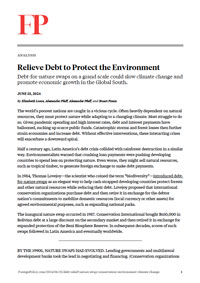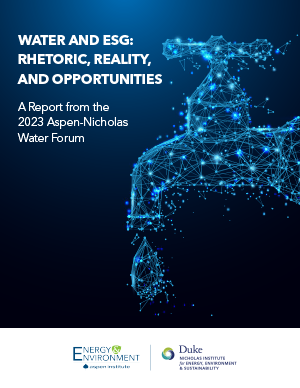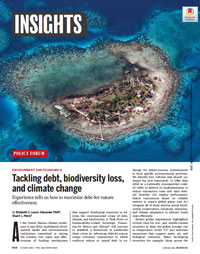Publications
Unlocking Clean Energy Projects Using Tax Chaining: A Primer
This paper provides a high-level overview of chaining, an emerging concept that marries two highly consequential provisions of the tax code established by the passage of the 2022 Inflation Reduction Act (IRA): Transferability of tax credits and direct (also known as elective) pay to nonprofit or public entities in lieu of tax credits.
Besides unlocking additional capital, chaining could reduce the cost of capital, ease cash flow, and allow for different parties to share risk. The US Department of the Treasury is actively accepting comments on chaining until December 1, 2024. Through those comments, Treasury is seeking to ascertain, in part, how much more capital chaining can enable and how chaining would be executed.
Evaluation of Publicly Accessible Nature-Based Solutions Databases as Sources for Evidence of Effectiveness
Nature-based solutions (NBS) address societal challenges by managing ecosystems to provide environmental and human benefits. This report assesses 27 publicly accessible databases on NBS research and projects, highlighting their utility as well as limitations and gaps in coverage. Key recommendations include making databases downloadable, adding standardized geographic and project attributes, and improving measurement of effectiveness. Better data accessibility and consistency are essential for developing design standards and scaling up NBS implementation.
Meet the Mississippi
"The challenge for any writer taking on the Mississippi is balancing scope with readability, and this is where Upholt's book makes a real contribution," writes Martin Doyle, director of the Water Policy Program, in this review of Boyce Upholt's The Great River. Doyle discusses the book's place among the many volumes about the river's impact and history.
Relieve Debt to Protect the Environment
Debt-for-nature swaps on a grand scale could slow climate change and promote economic growth in the Global South.
Measures of Electric Vehicle Charging Infrastructure Across the Southeast: Recent Growth and State Trends
Electric vehicle (EV) market share is increasing and substantial public and private investment in EV charging infrastructure is rising to meet demand. This report examines recent developments across a dozen states in the Southeast.
Resilience Monetization and Credits Initiative: A Background Paper
Addressing climate change requires urgent and innovative action aimed at both mitigating its effects and addressing its most severe impacts. However, current investment levels are insufficient to match the escalating climate risks and damages. Despite the annual target of $100 billion established at the 2009 United Nations Climate Change Conference/Conference of Parties, climate finance directed to low- and middle-income countries continues to lag behind stated goals.
Improving Market-Based and Government-Run Adaptation Solutions for Mitigating Flood Risk Using Natural Infrastructure
The goal of this research is to understand the implications of using nature-based solutions, or natural infrastructure (NI), to mitigate the impacts of flooding. The two solutions I evaluate to supply NI are a program that financially incentivizes its supply by private landowners, and a government-run floodplain property acquisition program. This dissertation consists of three papers examining payments for ecosystem services (PES) programs in terms of enrollment, incentives, and outcomes.
Water and ESG: Rhetoric, Reality, and Opportunities
Building on the ongoing theme of “What does good water governance look like for the United States?,” the objective of the 2023 Aspen-Nicholas Water Forum was to explore why, despite the centrality of water to the environment, as well as to communities and society broadly, water has simply been overlooked in environmental, social, and governance (ESG) goal-setting processes, analyses, or frameworks. The forum also asked what might be the opportunities, or risks, of greater inclusion of water into ESG generally. This report highlights the discussions at the forum on how ESG does, and does not intersect with water, and what the challenges or opportunities might be.
Tackling Debt, Biodiversity Loss, and Climate Change
Debt distress, biodiversity loss and climate change are interconnected crises for developing countries. A task force of multilateral development banks and environmental institutions is convening a task force to establish a framework to ameliorate these crises by reforming debt-for-nature swaps. The authors of this Policy Forum identify four reforms that should underpin the new framework.
From Concept to Practice: Financing Sustainable Blue Economy in Small Island Developing States, Lessons Learnt from the Seychelles Experience
Despite international enthusiasm, private-sector finance for sustainable development and the blue economy still makes up a very small percentage of global investment. Repurposed bonds and debt-for-nature swaps have gained support with policymakers, international organizations, and investors keen to align their investment with global goals and borrowing countries with large ocean domains seeking new sources of finance.










